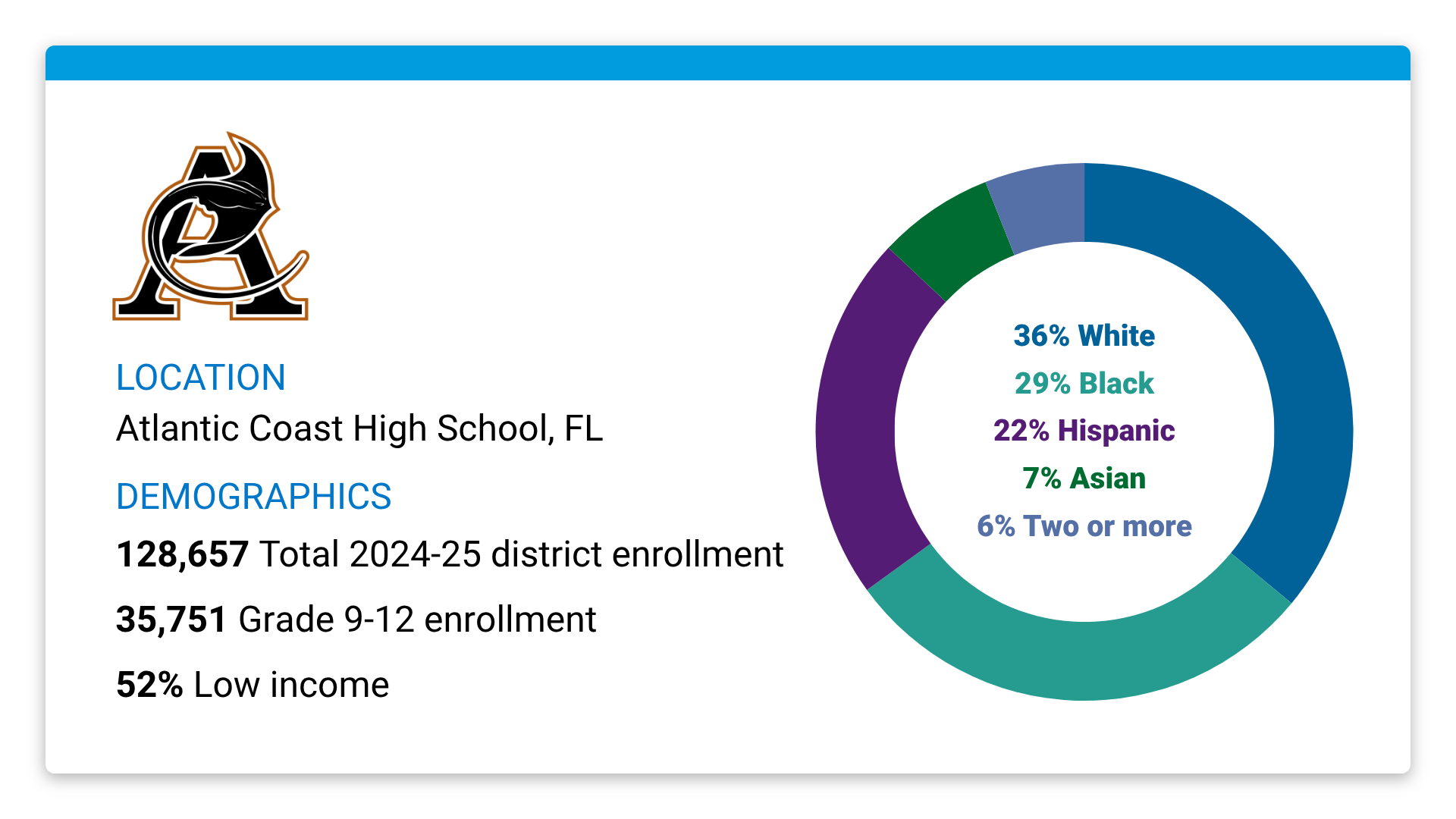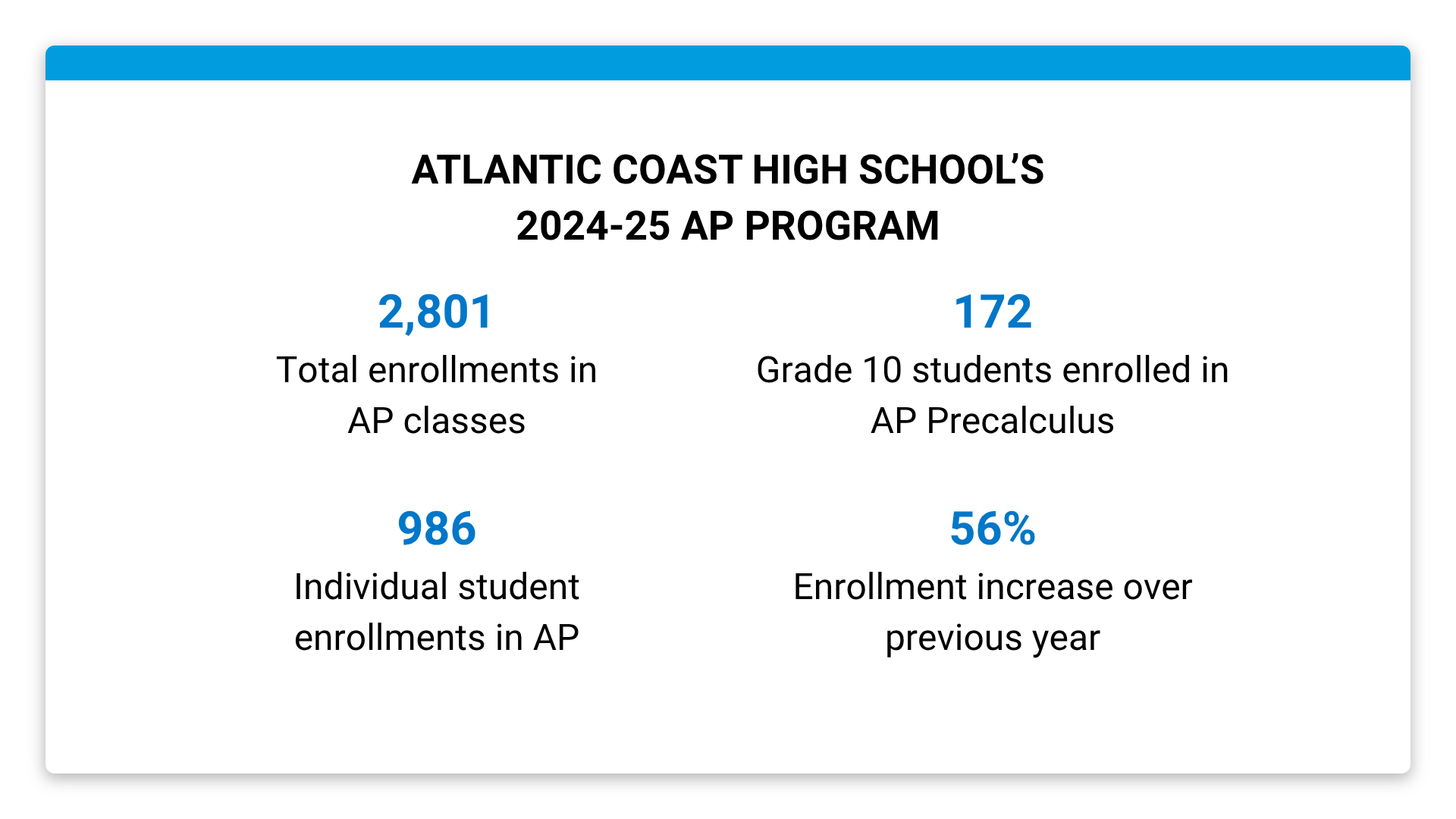Empowering Students and Expanding Access with AP Precalculus
At Atlantic Coast High School, we strive to make advanced coursework accessible to every student. In recent years, we’ve dedicated ourselves to encouraging students across all grade levels to take Advanced Placement® (AP) courses. This initiative has been incredibly successful, with many students who previously might not have even considered taking AP courses now enrolling and excelling. Our efforts are particularly evident in encouraging all Algebra 2 students, not just those in honors classes, to enroll in AP Precalculus.
Identifying the Opportunity
Atlantic Coast High School in Duval County, Fla., epitomizes a melting-pot community, with a student population representing 80 countries and 40 languages. We are a Title I school, serving more than 2,800 students, and we offer 28 AP courses.
Here, we always seek ways to bolster our “advanced is a mindset” culture. We encourage students to take AP courses at all levels. Although, the coexistence of honors precalculus and AP Precalculus blurred the lines in the advanced math domain, and we struggled to make a good distinction in the rigor of honors versus AP. So, we decided to go all in on AP.
Turning Opportunity Into Action
The decision to fully commit to AP Precalculus resulted in the unexpected bonus of opening access to even more students who formerly would not have taken on the AP challenge.
AP Precalculus teacher Laurie McDonald says, “For my kids who have never taken an AP or, in some cases, an honors-level math class, this course can be a game changer. I don’t think the importance of realizing you are capable of doing challenging and rigorous work can be overstated and, for many kids, this course gives them that understanding.”
Given the varying skill levels at Atlantic Coast, we needed to create a “welcoming vibe” for all students, regardless of their past math class experience. That meant diversifying our instructional approaches to demonstrate multiple ways to learn.
“I have watched classes of kids that really do reflect the diversity of our huge, amazing school—classes with kids who have always been ‘advanced,’ English language learners, students with disabilities, seniors, juniors, sophomores—and I’ve watched them all work side by side and discover that this was something they could actually do.”
Laurie McDonald, AP Precalculus Teacher
Among the student groups to find their footing with advanced coursework are ESE (Exceptional Student Education) and English language learners (ELL). Often, our ELL students are capable math students, but the language learning poses a barrier.
ELL students, in particular, thrive in AP Precalculus because there is more focus on conceptual understanding and the precise use of mathematical language. As a result, they have more meaningful opportunities to learn and practice new vocabulary. According to McDonald, “They were not constantly needing to switch gears to learn entirely new vocabulary linked to very distinct math concepts.” Another advantage is the collaborative nature of the class, so students have more opportunities to practice their language with their peers and their teacher.
“It’s absolutely amazing to watch kids who truly do not see themselves as math people change their minds. It opens an enormous number of doors for them and is incredibly inspiring.”
Dr. Michael George, Principal
We found the course itself to be incredibly well constructed and one that enables students to develop the thinking and reasoning skills to understand that math itself tells a story.
Overall, we’re finding AP Precalculus not only opens the door to further STEM coursework, but it also builds confidence to take on other challenging coursework.
Evaluating the Outcomes
Since introducing the course, enrollment continues to grow. We added two sections for a total of seven in the 2024-25 academic year, which has allowed more than 170 students to benefit from the course. Enrollment is up 56% over last year and we more than doubled the number of seniors taking the course and nearly tripled the number of ESE students. We even saw an increase of 44% in AP Calculus AB enrollment.
Success has been reflected by exam outcomes as well, with 95% of our students scoring a 3 or higher on the AP Precalculus Exam in 2024. Beyond the numbers, perhaps the voices of our students provide the clearest barometer of success.
“Just because it’s difficult doesn’t mean I can’t do it. I went into this class not understanding it at all and praying for a C, however I have had two Bs in a row. There is more logic compared to my other classes. In the unit we are on now, I can logically put things together and I see how they are actually useful in my life."
Sophie S., student
“AP Precalculus is definitely a layered math class in which every single concept intertwines one way or another. When you get it, you get it. The most important thing that I’ve learned is to continue to ask questions, build on knowledge, and review. Take advantage of every single opportunity to review.”
Jasmin L., student
Practical Pointers
- Foster an “Advanced Is a Mindset” Culture: Remind students that attitude can have just as much impact on their success as aptitude.
- Diversify Instruction: Ensure all students feel welcome and supported by tailoring teaching methods to accommodate different math skill levels.
- Define the Vision: Clearly communicate the big-picture goals when introducing AP and new AP options. That helps faculty and staff understand the “why” and buy in more quickly.
- Set Up for Success: Make sure that teachers new to the course have opportunities for professional development, like AP Summer Institutes. This can help teachers adjust how they present the content to a wider range of students.
- Don’t Assume: Not every student, including seniors, necessarily
understands the value of AP credit. Consider having one-on-one
conversations to enlighten strong AP candidates.

